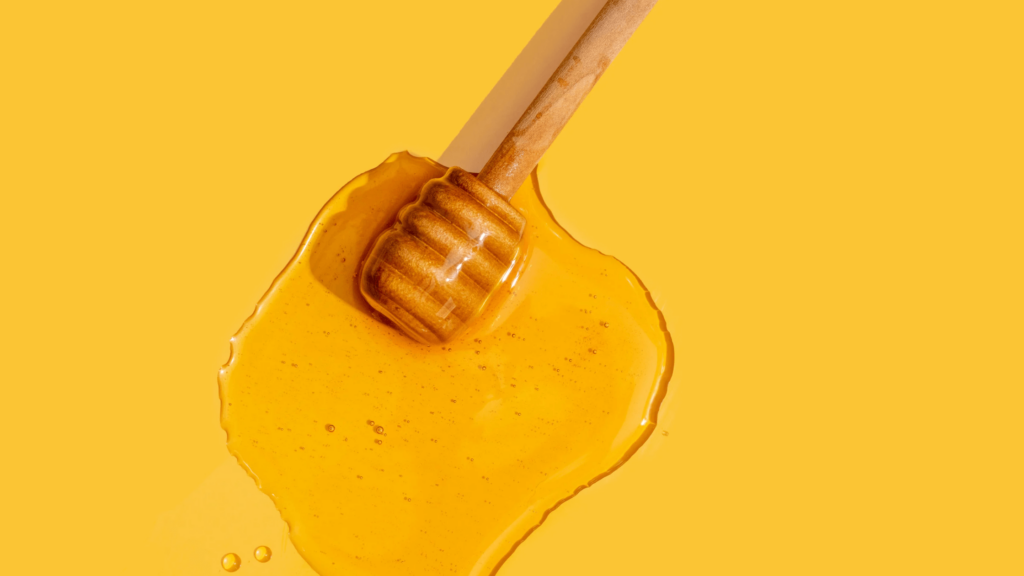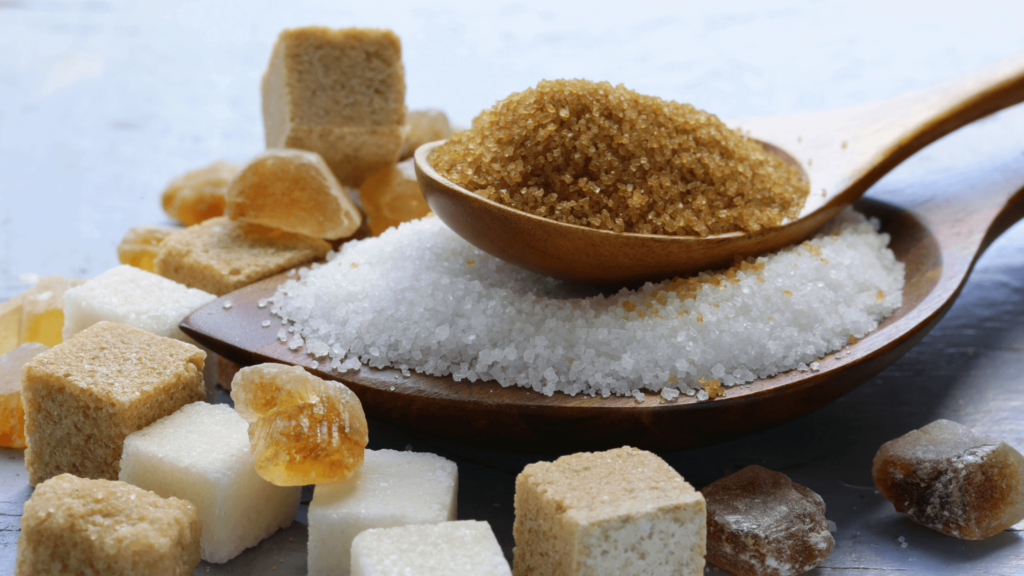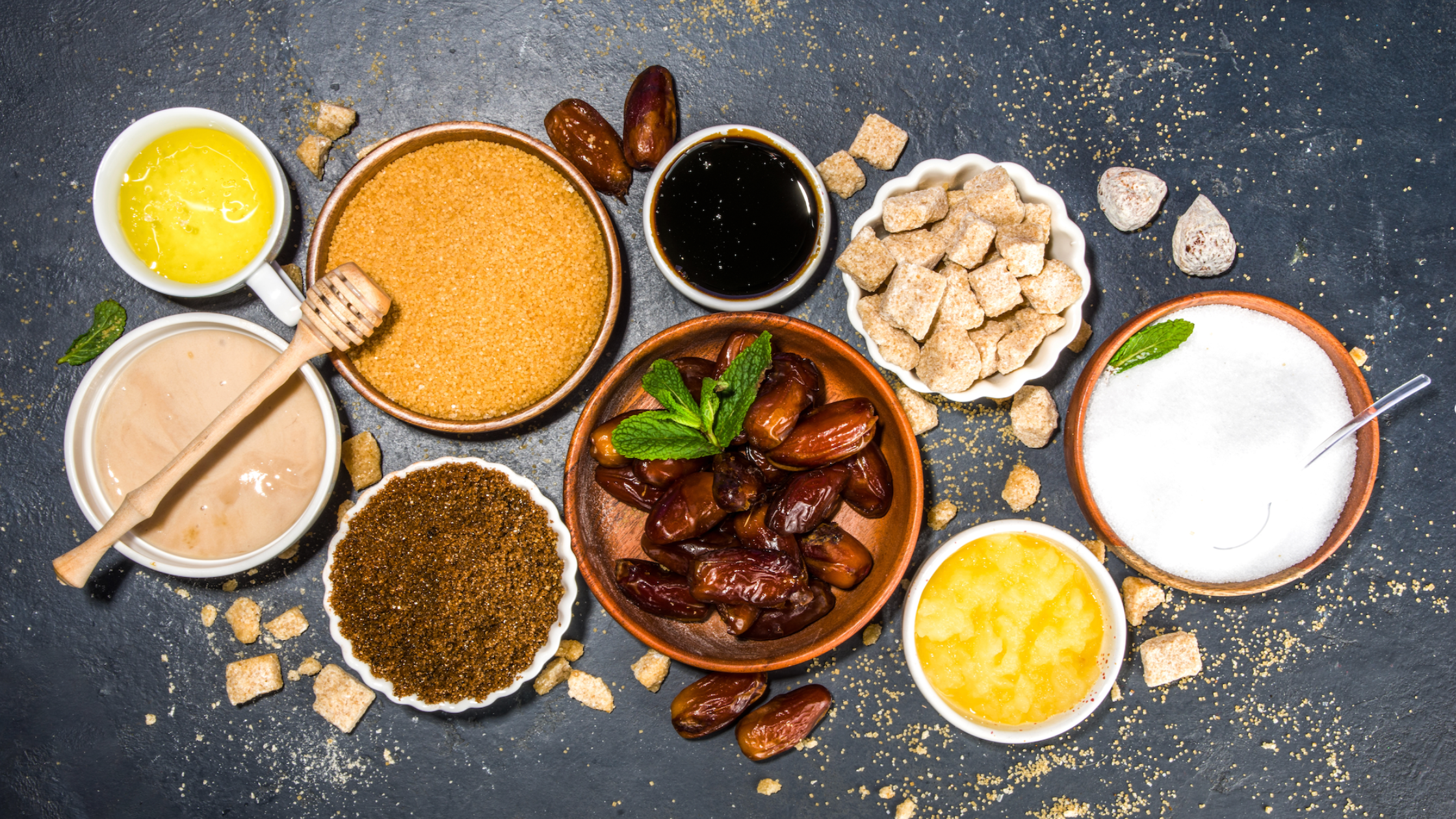Excessive sugar consumption can lead to numerous health issues, such as obesity, diabetes, and heart disease—these also happen to be some of the most common health issues for construction workers. Studies show that high sugar intake is associated with an increased risk of cardiovascular disease by 38%. Fortunately, many healthier sugar substitutes, such as raw honey and maple syrup, can satisfy your sweet tooth without the big downsides.
9 healthier sugar swaps to try

Raw honey
Raw honey is a delicious natural sweetener and white sugar substitute that’s packed with health benefits. Unlike processed honey, raw honey is unfiltered and unpasteurized, retaining all its natural enzymes, vitamins, and minerals.
It’s rich in antioxidants and has antibacterial properties, making it great for soothing sore throats and boosting your immune system. However, it is higher in calories—around 64 calories per tablespoon compared to 49 calories per tablespoon of granulated sugar.
Stevia
Stevia is a zero-calorie sweetener derived from the leaves of the stevia rebaudiana plant. It’s a fantastic option if you’re looking to reduce your calorie intake without sacrificing sweetness.
That said, stevia is about 200-300 times sweeter than sugar, so a little goes a long way. One of the best things about stevia is that it doesn’t raise blood sugar levels, making it a great choice for people with diabetes or those trying to curb blood sugar highs and lows.
Monk fruit
Monk fruit sweetener is made from monk fruit extract and is another sugar substitute. It’s much sweeter than sugar, about 150-200 times sweeter, but contains zero calories, making it perfect for those on a low-calorie or low-carb diet. Like stevia, monk fruit sweetener doesn’t affect blood sugar levels, making it a safe option for people with diabetes.
Maple syrup
Maple syrup is another tasty alternative to refined sugar. It contains antioxidants and essential minerals like zinc and manganese, which offer health benefits. But it’s not just good for pancakes and waffles—it can also be used in baking and cooking as a sweetener. Just remember that it’s high in sugar, with 52 calories and 12 grams of sugar per tablespoon.
Erythritol
Erythritol is a sugar alcohol found naturally in some fruits and fermented foods. It has about 60-70% of the sweetness of sugar but with zero calories per gram. Unlike sugar, erythritol doesn’t raise blood sugar or insulin levels, making it popular sugar substitute for weight loss and diabetes management.
However, recent research links erythritol to potential health risks like heart attack and stroke. Despite these concerns, the FDA generally recognizes erythritol as safe and benefits dental health by reducing cavity-causing bacteria.
Xylitol
Xylitol is a sugar alcohol found in fruits and vegetables and is often used as a sugar substitute in sugar-free products. It has about 2.4 calories per gram and does not raise blood sugar or insulin levels, making it a popular choice for diabetics. Xylitol is beneficial for dental health, helping to reduce the risk of cavities by neutralizing acids and inhibiting the growth of harmful bacteria in the mouth.
However, it is highly toxic to dogs, even in small amounts, so pet owners should avoid using products containing xylitol. And despite its many benefits, excessive consumption of any sugar alcohols can lead to digestive issues like bloating and diarrhea in some people.
Dates
Dates are a whole fruit with natural sweetness and a good source of fiber, potassium, and magnesium. They’re often used as a natural sweetener in smoothies, baking, and cooking—you can even make a date paste if you need a liquid sweetener.
Due to their high fiber content, dates are a great source of essential nutrients and are beneficial for digestion. Put simply, they’re one of the best whole-food sugar substitutes because they offer additional health benefits beyond just sweetness.
Coconut sugar
Coconut sugar is derived from the sap of coconut palm trees. It has a lower glycemic index than regular sugar, meaning it causes a slower rise in blood sugar levels and mitigates the highs and lows that come with white sugar. Coconut sugar retains some nutrients found in the coconut palm, including iron, zinc, calcium, and potassium. It’s an excellent substitute in baking and cooking, offering a caramel-like flavor. It’s still high in calories and should be used in moderation.
Agave nectar
Agave nectar comes from the agave plant and is known for its lower glycemic index than sugar, making it a popular choice for those looking to manage blood sugar levels or reduce sugar intake. It’s sweeter than sugar and contains Vitamin B6, which helps to protect you from heart disease and stroke. However, it’s high in fructose, which can be problematic for liver health if consumed in large amounts.
The dark side of sugar
Sugar tastes good—but while your taste buds may love it, your body doesn’t. Excessive sugar consumption is linked to a myriad of health issues, making it a big concern for most people. Regardless of what type of sugar you are consuming, sugar is sugar and increases the risk of developing the following:
- Metabolic disorders: High sugar intake can lead to insulin resistance, a condition where the body’s cells don’t respond properly to insulin, increasing the risk of type 2 diabetes. Over time, this can cause chronic health problems and complications.
- Cardiovascular issues: Consuming too much sugar can increase your risk of heart disease. Studies show that people who consume 17-21% of their daily calories from added sugar have a 38% higher risk of dying from cardiovascular disease compared to those who consume 8% of their calories from added sugar. Because construction workers are already at a higher risk of cardiovascular issues, reducing sugar intake is highly recommended.
- Obesity: Excessive sugar consumption contributes to weight gain and obesity. Sugar-laden foods and beverages are often high in calories and low in essential nutrients, leading to an imbalance that promotes weight gain.
- Depression and anxiety: High sugar intake is also linked to mental health issues. Consuming too much sugar can lead to mood swings, fatigue, and symptoms of depression and anxiety. Over time, these mental health issues can become more severe, especially when combined with a high-stress job.
- Liver damage: Excessive fructose, a type of sugar found in many sweetened beverages and foods, can lead to non-alcoholic fatty liver disease (NAFLD). This condition occurs when too much fat builds up in the liver, increasing the risk of liver inflammation and damage.
Sugar is still sugar
We want to drive home that sugar is still sugar—the body can’t discriminate whether it’s natural or not. Whether you’re consuming white sugar, brown sugar, honey, or maple syrup, they all impact your blood sugar levels and overall health. Even natural sweeteners like agave nectar and coconut sugar contain high amounts of fructose, contributing to metabolic issues and liver problems when consumed in large quantities.
Artificial sweeteners, often marketed as healthier alternatives, also have a dark side. While they may not raise blood sugar levels as dramatically as natural sugars, they can still affect your body’s insulin response and gut health. Research suggests that consuming high amounts of artificial sweeteners can alter gut bacteria and potentially lead to glucose intolerance.
Ultimately, it’s all about moderation. No matter the source of sweetness, excessive consumption is no bueno for the body. The key is to limit your intake of all types of sugar and sweeteners, focusing on a balanced diet that includes whole foods, vegetables, and lean proteins. But it’s not always easy to see whether you are actually consuming sugar.
And there is a reason why.
The 50+ names of sugar

Sugar can be sneaky, hiding under various names on ingredient lists. Food manufacturers often list different types of sugar separately, making it difficult to see how much sugar is in a product. Here are just a few of the many names sugar can masquerade as:
- High fructose corn syrup: a common sweetener found in many processed foods and beverages.
- Cane sugar: another name for table sugar, derived from sugar cane.
- Sucrose: the scientific name for table sugar.
- Dextrose: a form of glucose derived from starch.
- Maltose: also known as malt sugar, is commonly found in malted foods and beverages.
- Fruit juice concentrate: often used in processed foods as a sweetener.
- Beet sugar: sugar derived from sugar beets.
- Maltodextrin: a polysaccharide used as a food additive and sweetener.
In addition to this list, sugar can be known by several other names. To make healthier choices, it’s essential to read ingredient labels carefully and be aware of these aliases. If you’re not sure what an ingredient is or can’t pronounce it, it’s best to put it back on the shelf.
Bottom line
A healthy diet is all about balance and being mindful of what passes your lips. Opting for natural sweeteners like raw honey, maple syrup, or dates is a healthier and more natural alternative that provides additional health benefits, but they should be consumed sparingly.
Our recommendations: Read labels, be aware of hidden sugars, and enjoy sweet treats in moderation.


